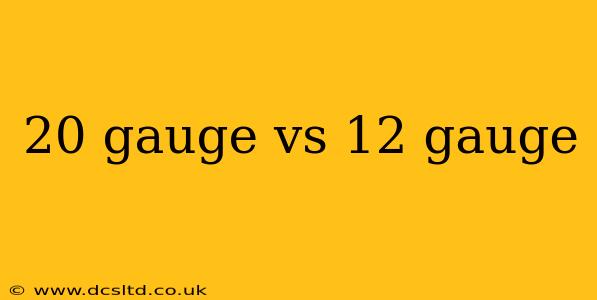20 Gauge vs. 12 Gauge: Choosing the Right Shotgun for You
Choosing between a 20 gauge and a 12 gauge shotgun is a common dilemma for both novice and experienced shooters. The decision hinges on several factors, including intended use, physical capabilities, and personal preferences. This comprehensive guide will delve into the key differences, helping you make an informed choice.
What's the difference in gauge?
Gauge refers to the diameter of the shotgun barrel. A lower gauge number indicates a larger diameter barrel, meaning it can fire larger shells. Therefore, a 12 gauge shotgun has a larger bore than a 20 gauge. This fundamental difference impacts several aspects of shooting performance.
Which Gauge is More Powerful?
12 Gauge: Undeniably, the 12 gauge packs a more powerful punch. Its larger bore allows for larger shells carrying more shot or slugs, resulting in significantly greater recoil and a wider spread pattern at closer ranges. This makes it ideal for hunting larger game or situations requiring stopping power.
20 Gauge: The 20 gauge is noticeably less powerful. The reduced recoil makes it easier to handle, particularly for younger or smaller shooters, or those sensitive to recoil. While still effective for hunting smaller game and sporting clays, its range and stopping power are less than a 12 gauge.
Recoil: A Key Consideration
12 Gauge: The substantial recoil of a 12 gauge can be challenging for some shooters, particularly beginners. This can lead to fatigue, flinching, and inconsistent accuracy.
20 Gauge: The significantly reduced recoil of a 20 gauge makes it much more comfortable to shoot, even for extended periods. This gentler recoil promotes better accuracy and reduces shooter fatigue, leading to a more enjoyable shooting experience.
Which Gauge is Lighter?
Generally, 20 gauge shotguns are lighter than their 12 gauge counterparts. This lighter weight contributes to easier handling, especially during extended hunting trips or sporting clay events. The reduced weight is advantageous for those who prioritize maneuverability and ease of carrying.
Which Gauge is Best for Hunting?
The "best" gauge for hunting depends entirely on the game being hunted.
-
12 Gauge: Ideal for larger game such as deer (with slugs), wild boar, or waterfowl at longer ranges. Its greater stopping power is crucial for ethical and effective hunting.
-
20 Gauge: Excellent for smaller game like rabbits, squirrels, and upland birds. Its lighter recoil and manageable power make it a suitable choice for younger hunters or those who prefer a lighter gun.
Which Gauge is Better for Sporting Clays?
Both gauges are suitable for sporting clays, but each has its advantages.
-
12 Gauge: Offers greater power and potentially a wider pattern, beneficial for certain clay targets.
-
20 Gauge: The lighter weight and reduced recoil allow for quicker target acquisition and less fatigue over many rounds, making it a popular choice among many sporting clays enthusiasts.
Ammunition Cost and Availability:
12 Gauge: Ammunition is widely available and generally less expensive per round than 20 gauge.
20 Gauge: Ammunition is available but might be slightly more expensive per round and potentially less readily available in certain areas or calibers.
Which Gauge is Best for Self-Defense?
While both gauges can be effective for self-defense, the 12 gauge generally offers a greater margin of stopping power. However, a well-placed shot from a 20 gauge is still capable of incapacitating an attacker. The reduced recoil of the 20 gauge might be preferred by some for faster follow-up shots. Ultimately, training and shot placement are far more crucial than the gauge choice itself.
Conclusion:
The best gauge for you depends on your individual needs and preferences. Consider your physical capabilities, intended use (hunting, sport shooting, self-defense), and comfort level with recoil. If you are unsure, renting or borrowing both gauges to try them out at a shooting range is highly recommended before purchasing.
